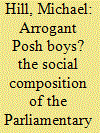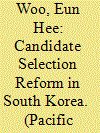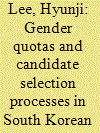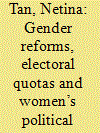|
|
|
Sort Order |
|
|
|
Items / Page
|
|
|
|
|
|
|
| Srl | Item |
| 1 |
ID:
122469


|
|
|
|
|
| Publication |
2013.
|
| Summary/Abstract |
In the light of the recent controversy over Andrew Mitchell's alleged 'pleb' comments to police officers and Nadine Dorries' characterisation of David Cameron and George Osborne as 'arrogant posh boys, this article examines the social composition of the parliamentary Conservative Party. It looks at previous attempts to widen the social base of the PCP and analyses the effect of Cameron's priority or 'A' list of candidates on the composition of the 2010 PCP. The article asks whether the perception that the Conservatives are the party of the rich has damaged the party's electoral appeal and if so what can be done to rectify the situation.
|
|
|
|
|
|
|
|
|
|
|
|
|
|
|
|
| 2 |
ID:
175592


|
|
|
|
|
| Summary/Abstract |
This paper analyzes how democratization has affected the dynamics of candidate selection in South Korea. After democratization in the late 1980s, it was expected that intra-party democracy would follow. In response to increasing public demand, the major parties adopted primary systems in the early 2000s. Nonetheless, most candidates for the legislature are still nominated by a small number of central party elites without additional ballots in the local branches. To explain the persistence of the exclusive, centralized features of candidate selection, I highlight the limited impact democratization has had on the political environment in which parties operate. More specifically, since democratization ended in a compromise among a small number of party leaders, South Korea retained much of the political legacy from authoritarian times, such an electoral system advantageous to the major parties and legal provisions restricting electoral campaigns, party activities, and political participation. The continuation of these political institutions makes radical candidate selection reform highly unlikely as the party elites have no incentive to expand and decentralize the selection process. Without significant changes to the political institutions at the national level, the dominance of the central party elite over the final outcome of candidate selection looks likely to continue for the foreseeable future.
|
|
|
|
|
|
|
|
|
|
|
|
|
|
|
|
| 3 |
ID:
145755


|
|
|
|
|
| Summary/Abstract |
South Korea is one of the few East Asian countries in which candidate gender quotas are legislated for all levels of government. However, the implementation of quotas has been only partially successful as political parties do not comply with quota laws in the majoritarian tier of the country’s mixed-member electoral system. To explain this non-compliance, this article examines how Korea’s party organizations and candidate selection practices have subverted quota implementation. More specifically, we employ Rahat and Hazan’s framework that disaggregates candidate selection processes into four areas—the selectorate, candidacy, centralization, and voting vs. appointment—and examine how two major Korean parties have chosen their candidates in the last three elections. By doing so, we demonstrate that in Korea’s under-institutionalized parties, where party organizations have been overshadowed by individual personalities, implementation of quotas can easily be subordinated to the clientelistic incentives of party leaders. While the parties’ centralized and exclusionary candidate selection procedures give party leaders a great deal of latitude to implement quotas, a better gender balance in the set of candidates is rarely a top priority for leaders in parties where personalism prevails. We argue that this explains why the quotas in Korea have been ineffective.
|
|
|
|
|
|
|
|
|
|
|
|
|
|
|
|
| 4 |
ID:
145753


|
|
|
|
|
| Summary/Abstract |
In the last two decades, more than 118 countries and political parties around the world have introduced gender quotas to guarantee women’s political representation. While the study of gender quotas and electoral systems is an exciting field, few studies have focused on East Asia. Why do traditionally male-dominated parties engage in gender reforms? Have gender reforms improved women’s political representation and participation? To address these questions, this introductory article offers an overview of the electoral rules, gender quotas, and candidate selection methods adopted in three broadly similar cases with different outcomes in Taiwan, South Korea, and Singapore. Taiwan and South Korea introduced mixed electoral systems and legislated candidate quotas to improve women’s legislative representation at the local and national levels. Singapore resisted legislating gender quotas while the ruling party voluntarily introduced a party quota in 2009. These gender equality strategies have brought slow and uneven results. Based on qualitative and quantitative methods as well as survey and electoral data, this paper offers new evidence showing why the effects of electoral systems and quota strategies are not automatic or mechanical, but dependent on the degree of party system institutionalization, electoral competitiveness, legal enforcement, and social-cultural attitudes toward women.
|
|
|
|
|
|
|
|
|
|
|
|
|
|
|
|
| 5 |
ID:
119198


|
|
|
|
|
| Publication |
2013.
|
| Summary/Abstract |
A central challenge for scholars of party politics is to explain parties' electoral success or failure. Campaign strategies, candidate personalities, electoral systems, parties' issue emphasis and policy positions all receive extensive coverage in the literature. One variable that has been neglected is the role of nomination systems in election results. This is surprising considering how politicians often blame candidate selection failures for disappointing electoral outcomes and then reform nomination mechanisms in the hope of improving future election prospects. In this study I examine the relationship between nomination systems and electoral results in Taiwan before and after the change in electoral systems. I show that candidate selection methods have played an important role in shaping Taiwan's party system under the old and new electoral systems.
|
|
|
|
|
|
|
|
|
|
|
|
|
|
|
|
| 6 |
ID:
185173


|
|
|
|
|
| Summary/Abstract |
Much literature covers how the rise of the Bharatiya Janata Party (BJP) in India impacted on the political marginalisation of Muslims, while it has not been examined in sufficient depth how the internal dynamics of Congress contributed to this decline in Muslim nominations for elections. This article examines the Congress party’s organisational circumstances that affected Muslims’ electoral representation in 1980s Gujarat. It demonstrates that, along with the influence of competing Hindutva forces, the ongoing ‘deinstitutionalisation’ of the Congress party also damaged the political representation of Muslims. Interview accounts and archival documents indicate how factional fighting within Congress subverted the faction-like consolidation of the Muslim leaders’ negotiation power. The article argues that despite vertical and dyadic ties with Hindu leaders inside the party, Muslim Congressmen could not attain unified leadership to generate sufficient pressure on the party to nominate Muslims for elections.
|
|
|
|
|
|
|
|
|
|
|
|
|
|
|
|
| 7 |
ID:
178992


|
|
|
|
|
| Summary/Abstract |
Previous studies have documented ethnic/racial bias in politicians’ constituency service, but less is known about the circumstances under which such ethnocentric responsiveness is curbed. We propose and test two hypotheses in this regard: the electoral incentives hypothesis, predicting that incentives for (re)election crowd out politicians’ potential biases, and the candidate selection hypothesis, stipulating that minority constituents can identify responsive legislators by using candidates’ partisan affiliation and stated policy preferences as heuristics. We test these hypotheses through a field experiment on the responsiveness of incumbent local politicians in Denmark (N = 2,395), varying ethnicity, gender, and intention to vote for the candidate in the upcoming election, merged with data on their electoral performance and their stated policy preferences from a voting advice application. We observe marked ethnocentric responsiveness and find no indication that electoral incentives mitigate this behavior. However, minority voters can use parties’ and individual candidates’ stances on immigration to identify responsive politicians.
|
|
|
|
|
|
|
|
|
|
|
|
|
|
|
|
|
|
|
|
|